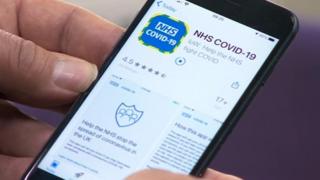Coronavirus: NHS contact-tracing app in place by end of month, says minister

The app was downloaded more than 55,000 times on the Isle of Wight, according to figures last month
A new NHS coronavirus contact-tracing app should be in place by the end of the month, a minister has said.
Business minister Nadhim Zahawi said the app – which was trialled in the Isle of Wight – will “be running as soon as we think it is robust”.
Last week new test and trace systems were launched in England and Scotland – but without the app due to delays.
The Guardian reported an NHS boss said the wider scheme would be imperfect at first but “world-class” by the autumn.
The paper said the chief operating officer of the test and trace scheme said the scheme should be fully working by September or October.
The NHS app – which will automatically alert people – began being trialled on the Isle of Wight in early May. The government said then it hoped it would be launched nationwide by the middle of May.
Meanwhile, doctors have urged the government to make face coverings compulsory in all places where social distancing is not possible, not just on public transport.
All passengers on public transport in England must wear a covering from 15 June, the government said on Thursday.
The NHS app was originally planned to be part of last week’s launch of England’s test and trace scheme – but the app roll-out was delayed because more trials were needed.
Scotland also launched its tracing scheme last week while Northern Ireland already had a contact tracing programme up and running. Wales began its scheme on Monday.
Speaking on the BBC’s Question Time on Thursday, Mr Zahawi said: “The app, we are working flat out. We want to make sure it actually does everything it needs to do and will be in place this month.
“I can’t give you an exact date, it would be wrong for me to do so.”
Mr Zahawi said: “We will make sure [the app] will be running as soon as we think it is robust.”
Asked to confirm it would be rolled out nationwide this month, he said: “I’d like to think we’d be able to manage by this month, yes.”
He said the pilot in the Isle of Wight showed people actually preferred to be contacted by a human being, “which is why we’ve recruited 25,000 people who are track-and-tracers who can deal with about 10,000 cases a day”.
Contact tracers text, email or call people who test positive with coronavirus and ask who they have had contact with. Any of those contacts who could be at risk of infection are told to isolate for 14 days, even if they are not sick.
The 25,000 tracers working for England’s NHS test and trace team have already started contacting people.
But some contact tracers have said they have been given very little work so far, with one telling the BBC she had worked 38 hours but had yet to make a single phone call and spent the time watching Netflix.
- Contact tracer ‘paid to watch Netflix’
Contact tracing for coronavirus began when the UK identified its first two cases at the end of January.
But it was stopped in mid-March after England’s chief medical officer, Prof Chris Whitty, said it was “no longer necessary for us to identify every case”.
Then in May, Prime Minister Boris Johnson pledged to have a “world-beating” tracing system in place from June.
NHS bosses have said such a system is important to avoid a possible second surge in coronavirus cases.
However, the head of the NHS Confederation said a test, track and trace strategy should have been in place sooner.
A Department of Health spokesperson said the new test and trace service was up and running and would save lives, adding that more than 25,000 contact tracers were now in place.
In other developments:
- The British Dental Association (BDA) warned there will be no return to “business as usual” for dentistry in England, as some practices prepare to reopen on Monday
- An exercise simulating a coronavirus outbreak in Scotland, which was shared with a UK government advisory group, revealed concerns over protective gear and contract tracing
- Campaigners have threatened to bring legal action against the government for not providing free school meal vouchers during the summer
- AstraZeneca said it will be able to supply two billion doses of a potential virus vaccine following two new deals
- The human rights watchdog will investigate racial inequalities “laid bare” by the pandemic
- A Public Health England report which investigated the impact of the virus on different ethnic groups was not led by the health official said to be in charge
How have you been affected by the issues relating to coronavirus? Share your experiences by emailing .
Please include a contact number if you are willing to speak to a BBC journalist. You can also contact us in the following ways:
